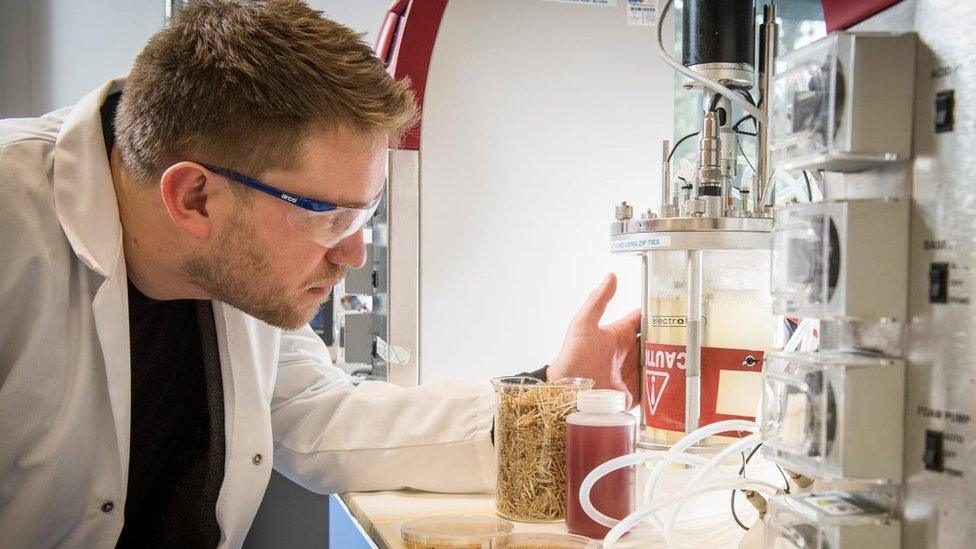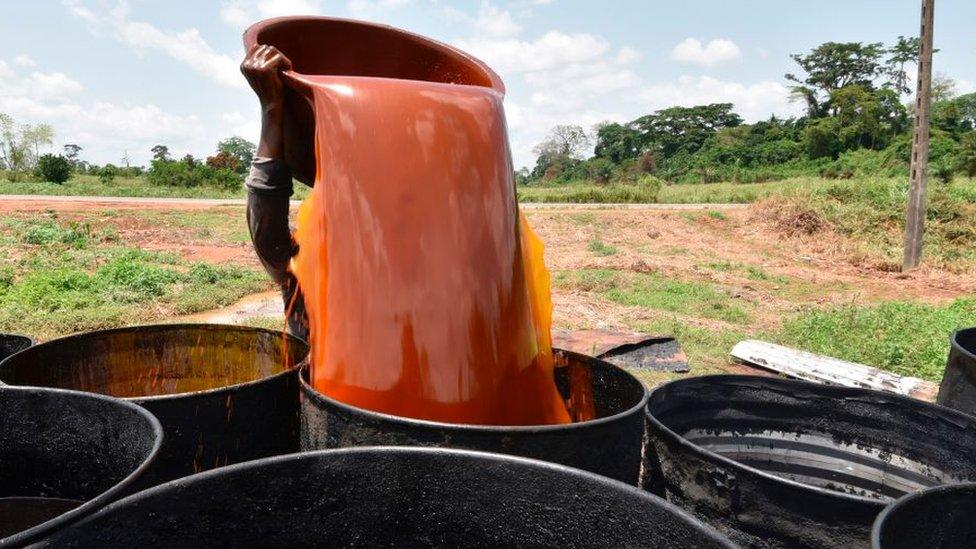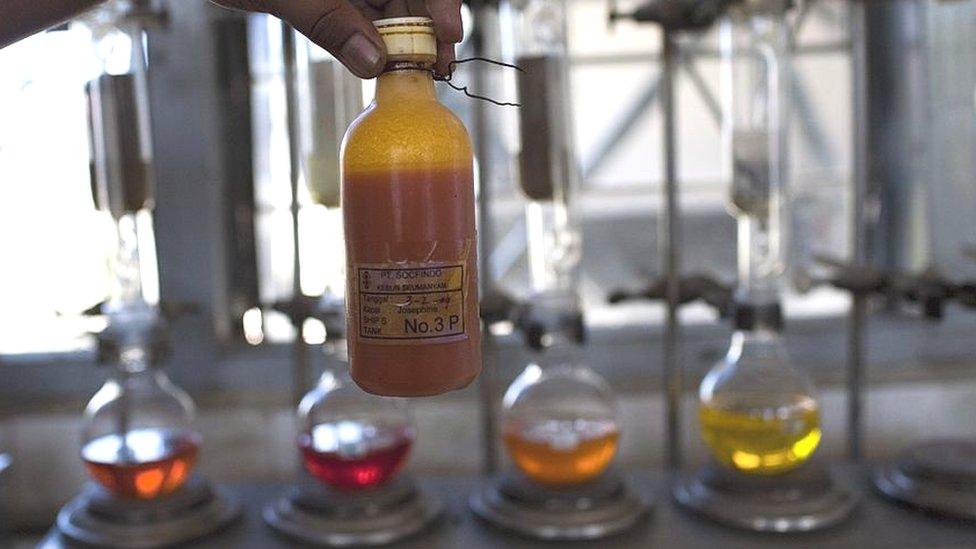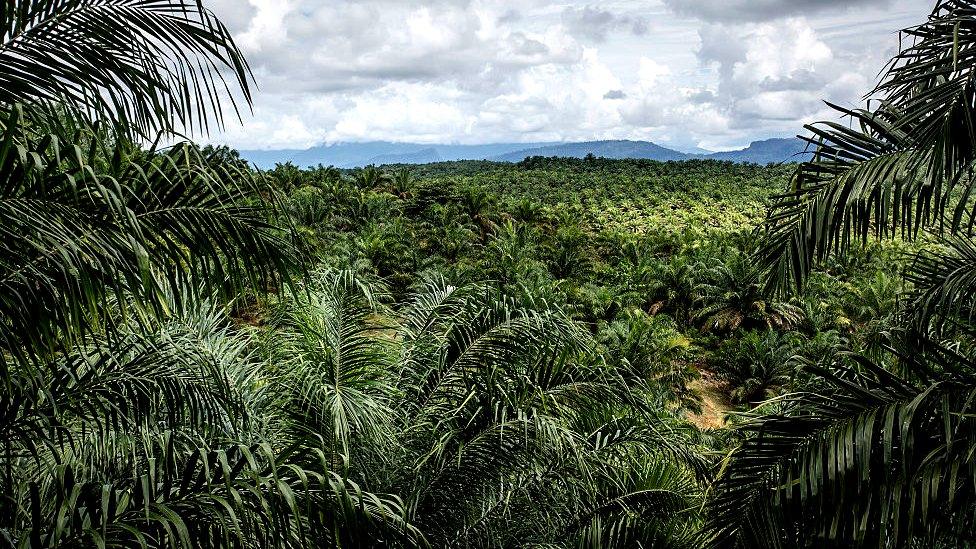A palm oil alternative could help save rainforests
- Published

Rainforest destruction in Indonesia is reducing the natural habitat of the orangutan
There's an ugly truth to the beauty products we slap on our faces and an unsavoury truth to the foods we eat: many are made with palm oil, which is responsible for the rapid deforestation of some of the world's most biodiverse forests, destroying the habitat of already endangered species like the orangutan, pygmy elephant and Sumatran rhino.
But now the biotech industry says it has come up with a solution - a synthetic alternative that doesn't involve burning down or clearing any rainforest. It says this could eventually replace natural palm oil in everything from shampoos, soaps, detergents and lipsticks, to food products like packaged bread, biscuits, margarine, ice cream and chocolate.
"Over the last 30 years, 50% of palm oil plantation growth has come at the hands of deforestation of tropical forest and peatland," says Shara Ticku, founder of C16 Biosciences, one of the biotech firms pioneering a synthetic alternative. "That is really the core of the problem we're trying to solve."
Research is still in a pre-commercial stage, but there's been high-profile interest in its potential. Earlier this year, C16 Biosciences, a three-year-old start-up based in New York, received a $20m (£15m) investment from Breakthrough Energy Ventures, a fund backed by Bill Gates and the likes of Amazon's Jeff Bezos, Michael Bloomberg and Virgin's Richard Branson.
C16 Biosciences is not the only organisation looking to come up with a synthetic alternative. Researchers are working on something similar at the UK's University of Bath and at California-based start-up Kiverdi.
"GM (genetic modification) engineering has opened up new advances," says Chris Chuck, professor of bioprocess engineering at Bath.

The real problem is cost because natural palm oil is extremely cheap says Prof Chuck
What these projects have in common is that they use a fermentation process, employing big vats in a procedure similar to brewing beer. At C16 Biosciences this involves using genetically-engineered microbes to convert food waste and industrial by-products into a product that is chemically very similar to natural palm oil.
"It's a yeast, we feed it sugars, then the yeast grows and they're able to produce large amounts of oil within their cells, and we have to squeeze out that oil or extract it," Ms Ticku says.
At the moment, the focus of C16 Biosciences is on creating a prototype, and getting feedback from companies that might choose to use it in their products. It has already had expressions of interest from Germany-based international food wholesalers, Metro Group.

Natural palm oil has a smooth and creamy texture and is odourless
"I think we can definitely imagine this (as a selling point) especially in non-food products, explaining to the customer that there is a synthetic palm oil used as an ingredient in, for example, dishwashing liquid and I think that customers will accept it," says Veronika Pountcheva, Metro's director of corporate responsibility.
But the challenges are substantial. To succeed commercially and at scale, a synthetic alternative must be capable of mimicking natural palm oil's versatility, making it a suitable replacement in everything from food to household products.


Natural palm oil has a smooth and creamy texture, and is odourless, making it a useful ingredient in many recipes. It is semi-solid at room temperature, so it can keep things like margarine spreadable, and it has a natural preservative effect that extends the shelf life of food products.
"Ultimately these (challenges) have technological solutions, it can be technically done," says Prof Chuck. "The real problem is cost, because natural palm oil is extremely cheap, and that's what a synthetic alternative is competing against."

Natural palm oil is a versatile ingredient for foods and beauty products
It is also competing against a crop that is hugely productive in terms of volume produced per hectare.
Prof Chuck's team calculate that synthetic palm oil is between two to three times more expensive than its natural version, and that's in a best-case, most cost-effective scenario. "In uses where price is important and is the main driver, for example in biofuel and food, that means a synthetic alternative is going to struggle."
Added to that is the aversion of consumers in many markets to eating anything that might contain an ingredient derived from genetically modified microbes.
"But in shampoo or other beauty products, you might be able to compete, because price isn't the main driver," says Prof Chuck.
That means a synthetic alternative risks becoming a niche product. The World Wide Fund for Nature (WWF) says that globally, 70% of the 75 million tonnes of palm oil consumed annually is used as cooking oil and as a food ingredient.
It estimates global consumption will rise to between 264 and 447 million tonnes by 2050, with an estimated five-fold increase in demand for palm-based biofuels by 2030. A synthetic alternative then may only make a small dent in natural palm oil's global production.

New palm oil plantations often replace existing rainforest
That, however, is not putting off C16 Bioscience's Shara Ticku: "We believe that with our technology platform, at a scale of hundreds of thousands of kilograms annually, we will be cost competitive with palm oil. If we can get enough people to change then there is no longer any justified reason for burning forest to produce this vegetable oil, and that is a success."
Natural palm oil producers are keeping an eye on these developments. "We watch them closely, but I don't think that realistically that alternative is there yet in terms of either its ability to produce at scale or the cost efficiencies," says Anita Neville of Indonesia's Golden Agri-Resources, one of the world's largest privately owned palm oil plantation companies.
In the meantime, she says, the firm is focused on improving its yield per hectare with new variants of its natural oil palm trees, as a way of limiting the land needed to convert to palm oil plantations.
But she warns too of unforeseen consequences if synthetic palm oil becomes a commercially viable alternative. "You're still going to have something in the region of 4.5 million farmers in Indonesia, who are growing palm oil today and who might be moved into crops that are more land hungry, for example rubber or timber," she says.
"So it's not necessarily synthetics good, traditional agricultural bad. It's finding the right balance."